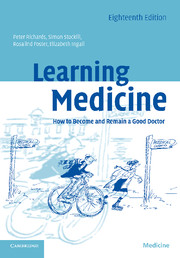Book contents
- Frontmatter
- Contents
- Foreword
- Preface
- 1 Why medicine and why not?
- 2 Opportunity and reality
- 3 Requirements for entry
- 4 Choosing a medical school
- 5 Application and selection
- 6 Interviews
- 7 Medical school: the early years
- 8 Medical school: the later years
- 9 Doubts
- 10 The new doctor
- 11 Developing your career
- 12 Career opportunities
- 13 Privileges and responsibilities: avoiding the pitfalls
- Postscript
- Appendices
- Index
11 - Developing your career
Published online by Cambridge University Press: 02 December 2009
- Frontmatter
- Contents
- Foreword
- Preface
- 1 Why medicine and why not?
- 2 Opportunity and reality
- 3 Requirements for entry
- 4 Choosing a medical school
- 5 Application and selection
- 6 Interviews
- 7 Medical school: the early years
- 8 Medical school: the later years
- 9 Doubts
- 10 The new doctor
- 11 Developing your career
- 12 Career opportunities
- 13 Privileges and responsibilities: avoiding the pitfalls
- Postscript
- Appendices
- Index
Summary
For as long as there are sick people around there will always be a need for doctors (and undertakers). One of the attractive features of a medical career in the UK has traditionally been the near-guarantee of full employment for the rest of your working life. A decade of reforms in the NHS, the expansion of medical school places and streamlined systems of training for junior doctors has reduced this certainty at least at bottle necks in the career structure. However, despite current challenges for newly qualified doctors the prospect of stable employment still holds true for the overwhelming majority of new doctors. This is not unconditional.You will need to remain competent to practise, keep up to date with medical advances and adhere to the standards of professional practice laid down by the profession's governing body, the General Medical Council (GMC). Another attractive feature of medicine is the surprising variety of jobs which you could consider after your early medical training. For every young medical school applicant who proudly declares at his interview that he intends to pursue a career in neurosurgery, there are perhaps 20 others who know only that they want to be a doctor and as yet have no real idea the precise form that ambition will take. Some will end up delivering babies (obstetricians) while others dissect dead bodies (pathologists), some will care for patients with rare inherited disorders (clinical geneticists) while others work on preventing diseases which affect whole populations (public health physicians).[…]
Information
- Type
- Chapter
- Information
- Learning MedicineHow to Become and Remain a Good Doctor, pp. 143 - 155Publisher: Cambridge University PressPrint publication year: 2007
